Can You Add a Basement to a House After It's Built?
Author: Rick Worst | Editor: Omar Alonso
Review & Research: Jen Worst & Chris Miller

Does your home have a basement? Do you wish it did? Can you add a basement to a house? A basement is a valuable part of a home, but not all properties have one. The neighborhood and how the house was constructed play a role in whether your property has a basement.
This post gives homeowners everything they need to know about adding a basement to their property. You don't need to tear down your house to add a basement. Modern building methods and technology make it possible to add a basement without collapsing the foundations or undergoing serious renovations.
Can a Basement Be Added to an Existing House?
The addition of a basement to your home gives you a living or storage space, adding value to your property. However, before you stop reading and pick up the phone to hire a contractor, there are a few things you need to know about the project.
There's an immense cost and plenty of effort involved in building a basement, and it's not always a financially viable solution for homeowners. You'll have to factor in all the renovations you need to make to the building when adding a basement, other than the construction work itself. And if you don't have an existing crawlspace you can expect to double the cost (at least).
Checking local laws, preparing plans, inspecting whatever types of house foundations are in use, and analyzing plumbing are just a few of the examples of the work involved with adding a basement to your home. These tasks all come with a price tag, adding to the project costs.
You'll need to consider the size of and the type of basement and prepare all the necessary risk assessments to ensure the new addition doesn't pose a safety hazard to your property. If you live in an area like Louisiana, where the ground is soft and possibly swampy, it might not be possible to add a basement to your home without compromising its structural integrity.
Adding a basement to your property requires careful, expert planning, and it's not something homeowners should undertake themselves. Cutting corners on constructing the basement could end up costing you a lot more in the damage it does to your home.
The Benefits of Adding a Basement to Your Home
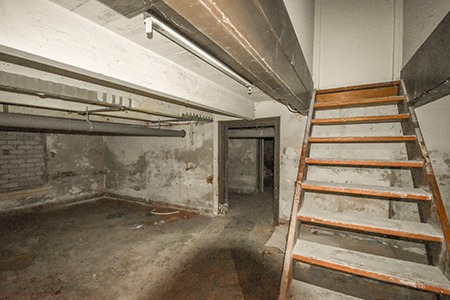
If you live in an area where several homes have basements, then there's probably no issue with adding one to your property. Adding a basement to your home extends the livable space on the property, adding value to its market price. This can really be helpful with patio homes where outward expansions isn't possible due to the lot size.
Basements are an in-demand feature for homebuyers, and you'll make your home more appealing to the market by adding one to your property as a livable basement counts as another story. A basement can act as a new bedroom, a play area or games room for the kids, or additional storage space.
If your home's footprint already consumes a large area of your property, you cannot add an above-ground extension to the house. As a result, underground construction is the only way to expand the living space on your property.
What's The Preparation Required for Digging a Basement?
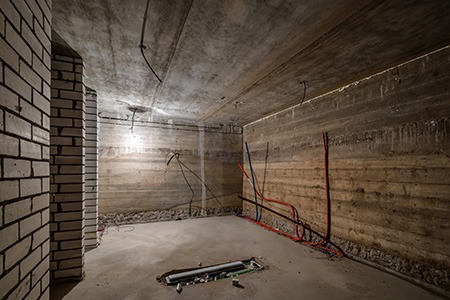
Can you add a basement to a house? Yes, but you'll have to complete the following tasks before you break ground on your basement. It's a sizeable project, requiring many steps before you can start the construction process.
Check Local Building Policies & Construction Laws
Before you bring in the contractor and the tractor-loaded backhoe (TLB), you'll have to check with the local municipality to ensure you have all the paperwork in place to approve the process. Your insurer will also need notification of your plans, as will the local homeowners association. These organizations might have policies in place preventing you from undertaking the project.
Check the zoning laws with your local municipality and see if they permit these construction projects before you start. If you approve the contractor to start the project, and the city council arrives and shuts it down, it will cost you a fortune in repairs, and you won't have anything to show for it.
Inspect the Foundations
Adding a basement to your property means digging underneath the building. So, you'll need to inspect the foundations to see if they can handle the addition of a basement and reinforce them where necessary.
You'll need to hire a professional surveyor and building inspector to complete this project step. They'll assess your property and approve or deny the construction based on their findings. If they give you the go-ahead for construction, you can contact a contractor, who will help you with the rest.
Ensure you work with a well-reputed contractor. Ask neighbors how hired contractors for a reference or locate a reputable company through social media.
How to Add a Basement to a House in 4 Steps
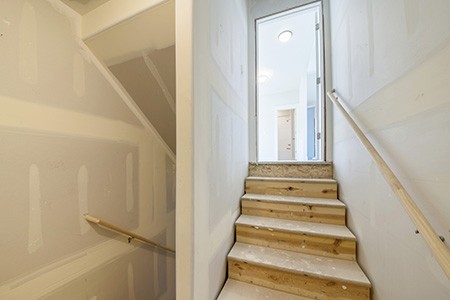
Adding a basement to your house is a step-by-step process. Here's an overview of what you can expect from the project.
1) Preparing Your Home for Construction
The first step in the project involves clearing the space for construction around your yard and in your home. Remove all bushes and trees around the construction site and map out all the electrical circuits and plumbing to prevent problems with the construction process.
You'll need a professional landscaper to assist with this, and they can help with grading the ground around the area to prevent water from entering the basement during heavy downfalls, which will keep your sump pump from running constantly, if you even end up needing one.
You'll also have to notify your neighbor of the construction work, and some neighborhoods require you to get their permission before you break ground.
2) Support the House Structure
Can you build a basement under a house? Yes, but the house and foundations will need support and strengthening before you start digging up the soil under the home. Contractors provide posts or blocks and skids for this purpose. These additions make it possible for workers to access their tools and machines during the excavation process without interfering with the living spaces or walls.
3) Digging Out the Basement
After clearing the yard of obstacles, the next step is to start the excavation of soil under your home. Most contractors use a backhoe for the task and will need access to your property to complete the job. The backhoe digs out the soil, moving it off your property into a dump truck that takes it to a landfill or green dump.
4) Start Construction
After completing the excavation process, the contractor adjusts the existing plumbing and adds new plumbing for the basement facilities. They also install ventilation and HVAC ducts to ensure the room has plenty of fresh air circulating through it.
They start adjusting the foundations to ensure they can support the weight of the home without any support from the underlying soil. They'll install a water membrane on the floor to keep water from seeping through the ground and condensing on the basement floor and walls. Waterproofing the basement is a must.
They finish by laying gravel on top of the membrane and pouring the concrete floor and walls.
What are the Costs of Installing a Basement Under a House?
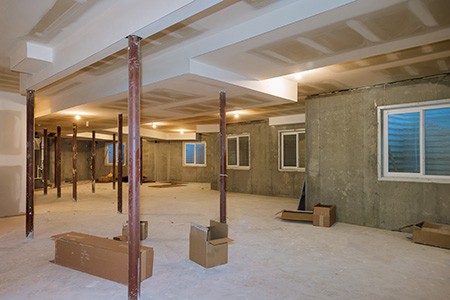
Installing a basement in your home is a costly project. Angie's List suggests the average cost to build a basement if you have an existing crawlspace is around $45,000 while building one without a crawlspace shoots the price up to $110,000, for a 2,000 square-foot basement.
The final costs depend on the type of concrete used, the contractor's fees, and how many layers of concrete they need to complete the task, the waterproofing costs, adding and securing basement windows, etc. The contractor builds the wall thickness in line with the local building code, with industry standards being around 32 inches thick. Tack on the waterproofing cost as well.
Typically, you're looking at costs being between $35 to $75 per square foot at least once it's all said and done, depending on the contractor, materials used, and the size of the basement. However, the costs don't stop with just the construction fees.
You'll also need to consider the expenses involved with installing new plumbing, insulation, electricity, and drainage. These costs can easily reach between $3,000 and $10,000, depending on the basement size. Additionally, costs involved with decorating the basement and furnishing it can end up running up to $20,000 or more, depending on the quality of fittings and furnishings you use.
Does Installing a Basement Add Value to My Home?
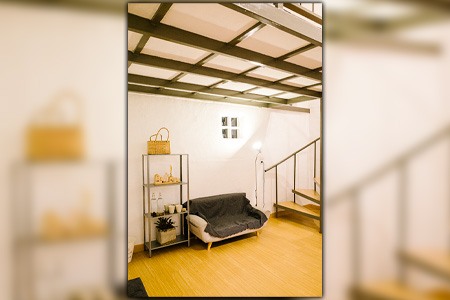
Yes. Adding a basement to your property raises its value with prospective buyers significantly, especially if it's a finished basement (meaning it's livable with painted ceilings, electricity and plumbing, and can be decorated and treated like any other types of rooms).
It might be a time-consuming and expensive project, but the work and investment involved with adding a basement will reflect your home's market value.
If you plan on selling your home one day, adding or revamping a basement makes your home more appealing to buyers than other properties in the area without these structures. So, consider that when weighing up the pros and cons of the project costs.
You'll likely benefit from a higher sales price on your home, covering more than the project costs, making it a viable financial investment in your property. Speak to your local estate agent and ask them for the selling prices of homes in your area with a basement versus those without one. They'll give you an accurate estimate of what you can expect.
The agent will have data on the selling price of homes in your area with basements. You can use this information to determine if building a basement on your property makes financial sense.
Can You Build a Basement After the House is Built?
Yes, you can do it but it won’t be easy, fast, or cheap. Building a basement is a lengthy project with many factors influencing its success. However, the most important one of all is choosing the right contractor. The contractor makes all the difference in the project outcome and success.
Ensure you investigate the contractor properly before hiring them and get references from their clients before committing to any contract. Once you sign the paperwork, there's no going back, and you'll have to live with the results, whichever way they swing. So, can you add a basement to a house after it's been built? You can, if you can afford the time and the cost.



